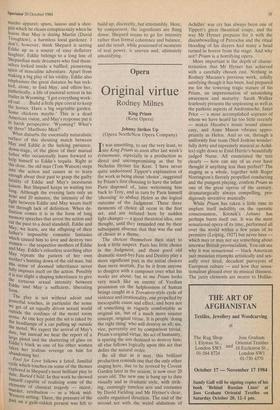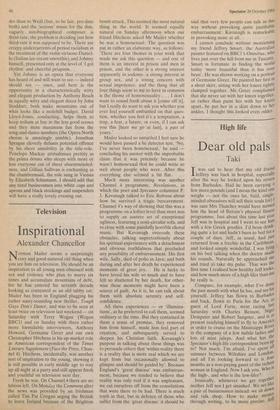Opera
Original virtue
Rodney Milnes
King Priam (Kent Opera) Johnny Strikes Up (Opera North/New Opera Company)
It was unsettling, to say the very least, to see King Priam so soon after last week's evenements, especially in a production as direct and uncompromising as that by Nicholas Hytner for Kent. I have never quite understood Tippett's explanation of the work as being about 'choice', suggested by Priam's first choosing to have the infant Paris disposed of, later welcoming him back to Troy, and in turn by Paris himself `choosing' to abduct Helen as the logical outcome of the Judgment. These three moments of choice all occur in the first act, and are isolated here by sudden light changes — a good theatrical idea, one thought, until they reminded one by their subsequent absence that that was the end of choice as a theme.
The choices themselves then start to look a little suspect. Paris has little choice in the Judgment, and those good old dramatic stand-bys Fate and Destiny play a more significant part in the initial choices than mere mortals. Far be it from anyone to disagree with a composer over what his works are about, but to me Priam looks very much like an enemy of Verdian pessimism on the helplessness of human beings caught in a Trovatore-style cycle of violence and irrationality, one propelled by inescapable cause and effect, and born not of something as vaguely comfortable as original sin, but of a much more sinister concept, original virtue. It is people 'doing the right thing' who will destroy us all; sin, vice, perversity are by comparison trivial. Priam's original virtue, his act of humanity, is sparing the son destined to destroy him; all else follows logically upon this act that defies the natural order.
Be all that as it may, this brilliant production reminds one that the only other staging here, due to be revived by Covent Garden later in the season, is now over 20 years old. The new one is bang up to date visually and in dramatic style, with strik- ing, cunningly timeless sets and costumes by David Fielding and Mr Hytner's clear, coolly organised direction. The end of the second act with the ' weird ululations of
Achilles' war cry has always been one of Tippett's great theatrical coups, and the way Mr Hytner prepares for it with the disembowelling of Patroclus and the ritual blooding of his slayers had many a head turned in horror from the stage. And why not? Priam is a horrifying opera.
More important is the depth of charac- terisation that Mr Hytner has achieved with a carefully chosen cast. Nothing in Rodney Macann's previous work, solidly satisfying though it has been, had prepared me for the towering tragic stature of his Priam, an impersonation of astonishing awareness and maturity. Sarah Walker fearlessly presents the unpleasing as well as the pathetic aspects of Andromache, Janet Price — a most accomplished soprano of whom we have heard far too little recently — makes Hecuba's music sound almost easy, and Anne Mason vibrates appro- priately as Helen. And so on, through a uniformly fine team (Neil Jenkins wonder- fully dotty and supremely musical as Achil- les) right down to Enid Hartle's beautifully judged Nurse. All enunciated the text clearly — how can any of us ever have thought it anything less than perfect? The staging as a whole, together with Roger Norrington's fiercely propelled conducting and the pungent playing, confirm Priam as one of the great operas of the century, dramaturgically always compelling, pro- digiously inventive musically.
While Priam has taken a little time to implant itself indelibly on the operatic consciousness, Krenek's Johnny has perhaps burnt itself out. It was the most sensational opera of its time, performed all over the world within a few years of its premiere (Leipzig, 1927) but never here which may or may not say something about interwar British provincialism, You can see why it was sensational — black American jazz musician triumphs artistically and sex- ually over tired, decadent purveyors of European culture — and how that sensa- tionalism glossed over its musical thinness. The jazzy elements are nearer to Holl'an- der than to Weill (but, to be fair, pre-date both) and the 'serious' music for the dim, vaguely autobiographical composer is thrid-rate; the problem is deciding just how third-rate it was supposed to be. There are creepy undercurrents of period racialism in the treatment of the violin virtuoso Daniel- lo (Italian ice-cream smoothie) and Johnny himself, presented only at the level of 'I got rhythm' and cheerful priapism.
Yet Johnny is an opera that everyone has heard of and will want to see — indeed should see — once, and here is the opportunity in a characteristically witty and elegant production by Anthony Besch in equally witty and elegant decor by John Stoddart: both make mountains out of what looks like a molehill budget. David Lloyd-Jones, conducting, helps them to keep tedium at bay in the less good scenes and they mine maximum fun from the song-and-dance numbers (the Opera North chorus is amazingly nimble). Jonathan Sprague cleverly defuses potential offence by his sheer amiability in the title-role. Penelope Mackay attitudinises prettily as the prima donna who sleeps with more or less everyone out of sheer absentminded- ness, and Gillian Sullivan is enchanting as the chambermaid, the role sung in Vienna by Elizabeth Schumann. I should add that any tired businessmen into white caps and aprons and black stockings and suspenders will have a really lovely evening out.



















































 Previous page
Previous page